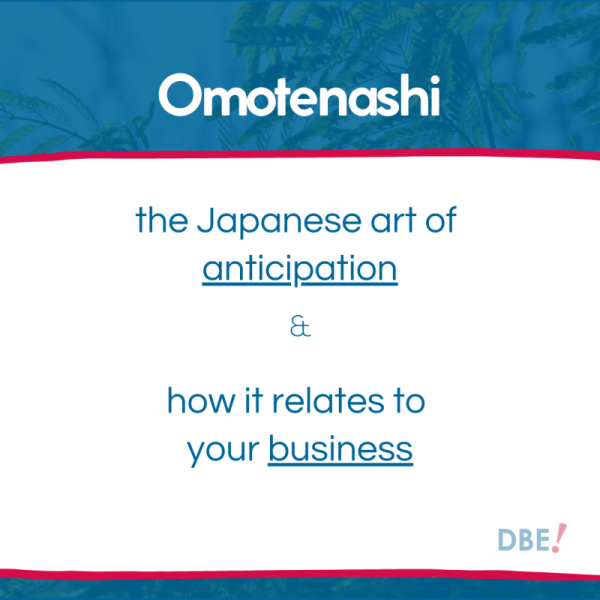You know that feeling when someone leaves a supportive message in your bag for you to find during a stressful day? Or that feeling when your waiter senses that you will need a refill in 5 sips from across the crowded restaurant? Or when someone grabs you your favorite white chocolate mocha latte with 2 shots of espresso without you ever asking?
You know that comforting feeling when someone has thought of you before you knew you needed something?
That’s omotenashi.
Originally a Japanese practice, omotenashi is translated as “hospitality,” especially when used in conjunction with the Japanese tea ceremony. However, the concept itself can’t be pinpointed to one action. It’s a combination of moving parts that anticipates the other party’s needs before they are expressed or, sometimes, known. Nobuko Kobayashi explains in this Bloomberg article “Japan’s Obsession with Service is Competitive Advantage”:
“Omotenashi shouldn’t have an instruction manual; it’s about basic care and respect for the other party. In this sense, it should be globally applicable, assuming that the practitioner is ready to think on his or her feet.” (bloomberg.com).
This “globally applicable” concept is just as relevant to business as it is to the tea ceremony. Yet, it is up to businesses to interpret and apply it for themselves. For us at DBE, our understanding of omotenashi in business is a meld of listening, anticipation, and gratitude. Let’s dive into this, shall we?
Listening
You can’t anticipate unless you listen. Simple, right? Not exactly true.
Listening encapsulates more than the words coming out of a person’s mouth. Real listening means paying attention to others’ non-verbal cues and, more complexly, their current perspective. Although there is no way to fully understand a person’s perspective, maintaining an open and receiving mindset is the closest way to get there.
Now, zooming back in on business, think of everyone involved in the process as a part of your team. There is no “red shirt vs. blue shirt” / “business vs. client” action. They don’t exist without each other. Therefore, a team is not just the employees, but the clients, partners, and all resources involved. The team is all the stakeholders. Every party deserves equal respect and all should ideally come to situations with an open and receiving mindset.
The value of listening in your work culture allows for closer business relationships and improves productivity and desired outcomes, including profits. (And, we all know that it’s about “who you know”.)
Anticipation
There is an acting/dance exercise where one person starts a repetitive motion. Then, one by one, other people interconnect their own repetitive motions until there’s a giant conglomeration of moving limbs that all affect one another.
Your team is similar. Each team member establishes their role and adds their uniqueness to the business process. Ideally, when one team member is out or misses something, you hope that the machine will still run.
The anticipation of needs is a team’s key to filling the gaps of human and worldly imperfection. A team that listens and understands each other is able to reach beyond their respective job to work toward the greater goal. This understanding leads to anticipation of needs. If there is a way to assist someone else, it should be natural and encouraged.
Japan Today writes “[a]nticipating needs is at the heart of [omotenashi]; and it is certainly fair to say that in Japan, acting on others’ needs without being asked to do so is at the height of savvy.” Some examples of this could be…
- 💭 brainstorming what questions will be asked during a client presentation and incorporating the answers in the presentation.
- ✨ planning a surprise Play-Doh competition for your team as a fun break in the workday. (Check out our team’s expert creations here!)
Gratitude
Take a moment to realize where you are. You’re reading a blog, so you, currently, have access to electricity, technology, and the internet. I’d say those are all things to be grateful for. All the small things in your life deserve gratitude and respect, just like your team.
Executive Chef Yoshiharu Kakinuma at Sushi Shikon relays that “[o]motenashi is grounded on mutual respect. While I consider it a privilege to serve, guests should pay respect to us.” (qtd. in guide.michelin.com).
Honoring and respecting other team members establishes trust and pleasure in a job. Underappreciation can lead to burnout in some cases. Forbes has an excellent article on how to show corporate appreciation if you’d like some inspiration. And think about it, who wouldn’t want to find pleasure in their job and the people they work alongside?
Gratitude has more than its fair share of perks. Naturally, amplifying gratitude leads to widespread satisfaction and happiness. Good for people and the planet.
Omotenashi: The Secret to Lasting Business (and Happier Work Lives)
Omotenashi is translated as “hospitality,” but it is much more than that. In a sense, it’s a way of living for greater good.
The West needs more values of Omotenashi in its businesses. Not only would clients appreciate the respect, but employee attraction and retention would flourish. Nic Thibodeau paints a beautiful picture in the Medium article, “The Meaning of Omotenashi”:
“Companies would treat their employees with the respect one would provide to all people, the employees would pass that onto the guest, and the guest would return that respect in kind. The overall experience would be happier at all levels, creating a more harmonious society that once again treasures the idea of respect” (medium.com).
The business process would become a huge pay-it-forward mission. That’s why it’s important to design and cultivate Omotenashi values in business.
Because, honestly, we all could use a little more Omotenashi in our lives….
Still haven’t quite quenched your thirst for incorporating the graceful art of Omotenashi in your business?
Listen to this episode of The Dan Nestle Show podcast featuring the wonderful host and business professional, Dan Nestle, and our President & CEO, Niki Fielding.
Works Cited
(Plus, Great Reading Material)
Japan Today. “The Business of ‘Omotenashi’.” Japan Today, 4 May 2014,
https://japantoday.com/category/features/opinions/the-business-of-omotenashi.
Kobayashi, Nobuko. “Japan’s Obsession with Service Is Competitive Advantage.”
Bloomberg.Com, June 2018, p. N.PAG. EBSCOhost,
discovery.ebsco.com/linkprocessor/plink?id=d6b6b5db-1717-3c45-85bf-bd6e6b3589e5.
Li, Mandy. “Omotenashi: The Reason Why Japanese Hospitality Is Different.” MICHELIN
Guide, 4 Apr. 2017, https://guide.michelin.com/sg/en/article/features/omotenashi.
Montañez, Rachel. “Here’s How Smart Companies Tackle Burnout Using Employee
Appreciation.” Forbes, Forbes Magazine, 31 Jan. 2021,
https://www.forbes.com/sites/rachelmontanez/2019/10/30/heres-how-smart-companies-tackle-burnout-using-employee-appreciation/?sh=73a6ecd62b0c.
Thibodeau, Nic. “The Meaning of Omotenashi.” Medium, Medium, 12 Aug. 2019,
https://medium.com/@nicthibodeau/the-meaning-of-omotenashi-19dfdcc4b20f.


